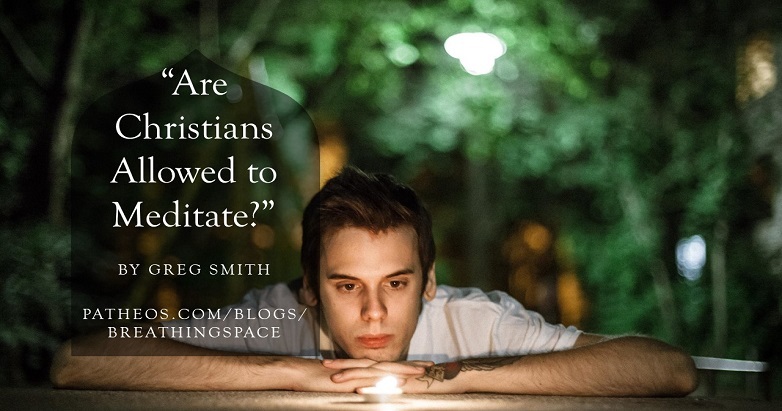“I’m a Christian,” said my coworker. “I’m not allowed to meditate.” He apologized that his religion prohibited him from attending a nonsectarian contemplative group at work. Sadly, his conservative church prevented practice that could have helped him find peace.

Meditating On Purpose
The first time I meditated on purpose was in a college course on Zen Buddhism, when the professor assigned us to sit zazen. The same semester, I also took a course in Taoism, in which the professor took the students outside and we learned stick-fighting techniques which were really a form of active meditation. We also had a unit on Tai Chi.
As much as I enjoyed those eastern techniques, part of me was afraid for my immortal soul. The church I attended believed those practices were New Age or pagan. But when I think about it, it wasn’t really in college where I first learned to meditate. Surprisingly, it was in that Evangelical church.
Meditating By Accident
When I was six or seven, a children’s minister led us in meditation. He gathered us kids together in a circle, darkened the room, and lit a single candle in the center of the ring of chairs. He told us to simply sit and breathe and look at the flame and think of Jesus as the light. There, in the flame that dispelled the winter darkness, I found peace.
I also learned meditation during the Lord’s Supper. In our church, we didn’t take Communion at the rail. Instead, we waited quietly while the bread was passed from pew to pew. After we partook, we waited quietly while deacons passed the little “Jesus shots” down the rows. I remember sitting so still, my chest rising and falling as I timed my breath to the rhythm of the classical piece played by our pianist. For me, those interludes during the distribution of elements became more sacred than the pastor lifting the juice and saying, “This is my blood, shed for you.” It was in those moments of inner silence that I found God.
Bible memory verses taught me to meditate, too. All for gold stars and plastic prizes, I memorized countless passages of scripture. Ostensibly, the point of scripture memorization is to get the verses into your head. But I can’t say I retained all the words mentally. Instead, I learned how to awaken God’s Word in my heart. I thought I was memorizing, but actually I was practicing mantra meditation. By repeating sacred phrases over and over, I tried to learn the scriptures. But I moved beyond the words themselves until I was changed at my core by the vibration, sound, and spirit of the Word.
Church Meditation Groups
The Evangelical church teaches meditation to its children, though it may not want to admit this. After I grew to appreciate how important it is to the soul’s wellbeing, I took advantage of every opportunity to join church meditation groups. Later, I even started a contemplative group in one of the churches I served. Interestingly, this ecumenical group was not well-attended by my own parishioners, even though it was our church that hosted the group. Though I encouraged participation, there’s something in Evangelicals that vehemently resists meditation. Which is ironic, as many elements of Evangelical practice prepare believers for the very meditation that they discourage.
Is Meditation Dangerous?
When I was young, I was taught you could “get a demon” if you meditate. “If you empty you mind, you’re making room for any evil spirit that wants to come in,” they told me. There are two problems with that. First, not all meditation is about clearing your mind. Second, the Bible never says you can catch an unclean spirit from meditating. That idea is a fiction that stems from fear of the unknown.
So, if the Bible doesn’t forbid me from meditating, what does it say about the practice? While there are numerous scriptures about meditation, here is a sampling:
- Genesis 24.63 – The first mention of meditation in the Bible shows Isaac meditating in a field before he meets his bride.
- Joshua 1.8 – Believers should meditate on God’s law, day and night.
- Psalm 1.2 – The one who meditates on God’s word is like a tree planted by water that grows fruit in its season, and always prospers.
- Psalm 4.4 – When you are on your bed, search your heart in silence.
- Psalm 19.14 – Before the psalmist meditates, they pray that their meditation and the words they use will be pleasing to God.
- Psalm 77.12 – Meditate on the mighty deeds of God.
Should You Give It a Try?
My coworker believed that his religion prohibited meditation. As a result, he missed a blessing. There are no rules for Evangelicals that say, “Thou shalt not meditate.” If you’re unsure whether you should try something new, I respect your caution. I suggest you read about the Christian practices of centering prayer and lectio divina. Or listen to Richard Rohr discuss it in this video. If you’re concerned about influences from outside your faith, stick within the contemplative tradition of Christianity, just so you’re comfortable. You aren’t inviting a demon, and you aren’t rejecting Jesus. Instead, you’re doing just as Jesus said—finding a prayer closet inside yourself and closing the door. From within your inner temple, you will find peace.













